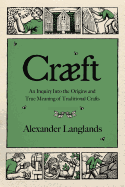
The Old English word "craeft" meant much more than the modern word "craft" usually does. Mental skill and virtue could be implied by it, and a sense of "power or skill in the context of knowledge, ability and a kind of learning." In Craeft, British archeologist and medieval historian Alexander Langlands (Henry Stephen's Book of the Farm) offers an entertaining and inspirational look at traditional skills that were part of ordinary English life for thousands of years, but were broadly abandoned with the advent of fossil fuels, mass production, plastics, pesticides and even cement. In the process, he says, we have literally lost touch with the world around us, and with the power and complex abilities of our own bodies.
Langlands performs many practical experiments on his rural English property, trying to replicate the results that field archeology and research pose in theory. His idealism and his love of the natural world and what we can learn to make of it are contagious. He deftly combines his hands-on experiences with historical knowledge in chapters on the skills of haymaking, pond making, pottery, dry stone wall building, spinning and weaving, tanning and leather work and more.
Most of these old skills produce less than modern methods, but they do so more reliably and cheaply, says Langlands, and often more beautifully as well. They were developed in circular (instead of growth) economies, grounded in the cultivation of finite local natural resources, and their resilience and sustainability deserves new attention. This is an illuminating book on the pleasures of traditional work, and how we can rediscover that tactile world of skillful creation. --Sara Catterall

